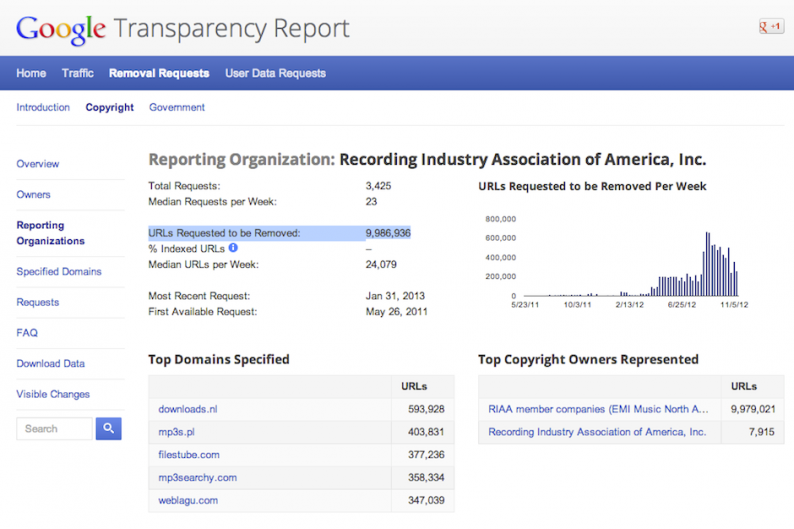The conflict between the music business and Silicon Valley is approaching a new milestone. As Digital Music News reports (via FACT), the Recording Industry Association of America has now asked Google to remove nearly 10 million links from its search results.
According to Google’s most recent transparency report, from May 2011 through February 1 the organization representing the major record labels filed takedown requests for a cumulative total of 9,986,936 individual URLs.
This might be bad news if you’re trying to illictly download a copy of that blessedly great new My Bloody Valentine album. And it’s difficult for anyone who lived through the Napster era to hear the phrase “RIAA” and not reach for our external hard drive containing a (hypothetically!) pirated copy of the Beatles’ Revolver — their lawyers are their own worst publicists.
But a few years ago, it was easy to download almost any record just through Google, which presumably profited from advertising placed next to the convenient MediaFire and MegaUpload links. The people who made the records, obviously, never saw a penny from our *.RAR’ed and *.ZIP’ed album acquisitions.
And to the extent that what comes up in Google search results helps set social norms, being able to find that not-yet-released indie-rock record courtesy of Sergey Brin and Larry Page made it seem like not paying for records was kosher in a way that torrent sites just don’t. When we downloaded files from Oink.cd, we had to go to some effort; grabbing a file through Google was easy as looking up the weather.
As FACT notes, the RIAA’s efforts parallel those of its closest U.K. equivalent, the British Phonographic Industry, which has also been ramping up pressure on Google to fight music piracy. The search giant has reportedly called for targeting the funding and infrastructure of illegitimate downloading sites rather than filtering through the search results. Likewise, a German royalty collection organization has ended talks with YouTube over fees for streamed music videos, according to TechCrunch.
The broader backdrop for the ongoing dispute between people who make money from music and people who make money from technology is an accelerating shift from downloading toward legal music-streaming services. There, too, as the New York Times recently detailed, concerns have arisen about the micro-pennies many musicians earn in royalties from their music compared with the multi-billion-dollar valuations of the tech companies who stream that music.
Look, the genie is out of the bottle. Milions of people are used to getting their music for free. As companies like Spotify, Pandora, and YouTube have sprung up to meet that expectation — again, legally! — the debate remains how much of the money from those services should go to the companies that provide the technology versus how much should go to the people who actually make the music. The RIAA dispute with Google is part of an older battle, one about downloads rather than streams, but it just goes to show how, either way, there are no easy answers here.





